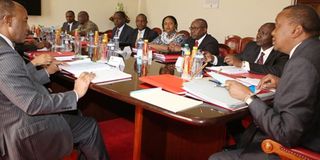What we should do to bolster security: Five examples from the United States

President Kenyatta chairs an NSC meeting. PHOTO | FILE
What you need to know:
- When a terrorist attack happens in the US, no matter what time of day or night, the President is notified within minutes
- Registration of foreign nationals should not be done with the aim of rounding them up and deporting them
As the country undergoes the travails of violence either from terrorists or internal conflagration, there are five important things the government should do to enhance safety:
1. Strengthen the National Security Council:
Members of the NSC should include the President (chair), his deputy, Cabinet Secretaries of the Interior, Foreign Affairs, and Defence, Chief of General Staff, Chief of the National Intelligence Service, Inspector-General of Police and the head of the CID.
The NSC would act as the principal forum for the President and his deputy to consider national security matters. It should also serve as the President’s arm for coordinating security policies among various government agencies.
It should meet regularly to evaluate the security situation and to discuss any intelligence information needing preventive action to be taken to avert a terrorist attack.
The NSC should oversee a seamless and efficient well-coordinated response in case of a terrorist attack whether orchestrated from internal or external actors.
As an example of how well such a well-coordinated response by a security council should work, consider the US National Security Council.
When a terrorist attack happens in the US, no matter what time of day or night, the President is notified within minutes. Immediately, a meeting of the National Security Council (mostly by teleconference) is called. Security operatives on the ground are roped in to brief the NSC team on the situation on the ground.
It is during such a meeting that the President makes a decision on the appropriate response. As soon as the decision is made, there is immediate mobilisation of state and federal resources to implement the decision.
Mobilisation is effected through a pre-existing mechanism and structure. At the same time, all facets of expertise involved in the matter immediately spring into action in a well-choreographed operation. By the time the President addresses the nation, the situation is usually under control.
The President’s speech entails descriptions of action already taken and actions underway rather than vague statements promising action. The symbolic gesture of the commander-in-chief addressing a security crisis serves to impress upon the citizens the seriousness with which the government takes its responsibility. It works.
2. Pass a Patriot Act:
Such an Act would be useful in facilitating intelligence-gathering in light of restrictions encoded in other laws that may hinder its success.
Fighting internally or externally orchestrated terrorism cannot be successful without robust intelligence-gathering and sharing.
This also ensures preparedness. The Act should arm law enforcers with new tools to detect and prevent terrorism, update the law to reflect new technologies and new threats, as well as facilitate information-sharing among government agencies.
3. Provisions for Registration of Foreign Citizens:
Whether we like it or not, there will always be foreign nationals living among us. This operation should not target any particular nationality and thus avoid accusations of profiling.
There is ample justification for such an operation since foreign nationals’ presence in Kenya is courtesy of Kenyans’ hospitality.
Indeed, following the 9/11 attacks in the US, the registration of citizens of specific countries such as Iraq, Afghanistan and Indonesia living in the US was started.
Registration of foreign nationals should not be done with the aim of rounding them up and deporting them. As long as they live peacefully, they should be given an opportunity to regularise their stay in Kenya.
4. Establish a Parliamentary Committee on Internal Security and Preparedness:
The creation of such a committee should be guided by the principle that promoting security is not a partisan issue and hence should draw members from all political affiliations.
The duty of such a committee would be to advise Parliament and the Senate on laws or decisions involving security.
5. Internal review of the NIS and other Intelligence and Security Agencies:
Such a review should be undertaken to strengthen preparedness, collaboration and coordination of the various security agencies both at the national and county levels.
Ms Njogu is an immigration attorney in Washington D.C. ([email protected] Web: www.rnwlawfirm.com)





